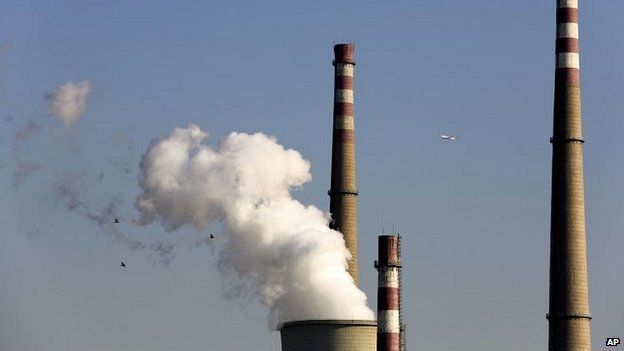'Long struggle' warning on climate
- Published

America’s chief climate negotiator has warned of the long battle ahead to cut greenhouse gas emissions.
Todd Stern told BBC News that by the end of the month, he expects the US to make a “quite ambitious” declaration on climate change.
He praised China’s projected offer to the December climate summit in Paris.
But he said the conference would not itself solve the climate problem. That, he argued, would need ongoing effort over decades.
Nations are desperate for the Paris meeting to avoid a repeat of the shambolic gathering in Copenhagen in 2009 that failed in its billing as the summit to save the planet.
This time, rich nations have agreed to make their offers well in advance to reduce the chance of last-minute chaos.
Long view
The EU has already offered a 40% cut on 1990 levels by 2030. The US will soon offer – probably a 26-28% reduction below 2005 levels by 2025. Comparison is hard because of different baselines, but some experts say the two appear roughly comparable in terms of effort.
China is expected to offer to peak emissions by 2030 at the latest, and to produce 20% of its energy from nuclear and renewables by the same date.
Mr Stern said: “You can look at the US, the EU, China - you could say I wish they did a little more than that, but that is a significant target the Chinese have announced. It’s not perfect - but then nobody’s is.”
He warned against expectations that the Paris summit would produce an agreement to keep global temperature rise within 2C.
“The two-degree goal will be reached if countries execute a deep decarbonisation of their economies over a significant period of time," he said.
“So what will we see from this agreement, if we get what I would like? We’ll get strong initial targets. They are not going to be everything everybody wants but I want to caution people against looking at this agreement from a 2015 snapshot.”
China’s commitment to add 800 gigawatts of renewables or nuclear was “really impressive,” he said. “This is an enormous amount – more than all the coal used in China now. To put it in perspective, the entire US energy system is about 1,100 gigawatts.”
I first met Mr Stern when he was advising President Clinton on climate policy. I asked if he felt positive about progress since then. He replied: “I think we have come quite far but there is quite far to go. In the US, more has happened to developing technologies and putting in place regulations that will drive the energy transformation. That has never happened before.
“On the international agreement, there has been a lot of movement and we have a historic opportunity to deliver an important agreement in which all countries are genuinely part of the regime and taking action that’s ambitious and rules-based, fair and durable. If we do this right, it will send a message to markets that we are on a path to action and there’s no going back.”
The US has recently begun to turn the screw on the other great power, India, which has declined to offer climate targets because it says India is too under-developed to make promises to cut emissions.
Pressure from the other powers is unwelcome in Delhi. “This is the pot calling the kettle black”, Kirit Parikh, a former member of India’s planning commission, told BBC News.
“China is saying it will peak in 2030 but not what level it will peak, and not when it will reduce emissions away from that peak,” he said. They could hit a peak and stay there. This is just an illusion of progress.”
His comments sound an alarm bell for Paris. The great economic blocs may be back-patting at their mutual efforts – but the summit is supposed to embrace all nations.
Mohamed Adow, a Kenyan working for Christian Aid, said: “The initial commitments from the big polluters are inadequate – they won’t put the world on the path to two degrees. Anyway, two degrees is too much for Africa – we are already seeing terrifying impacts after only 0.8 degree level of warming; that means adapt or die for parts of Africa and we can’t accept that.”
The great powers are likely to keep their promise to put their targets up for scrutiny this month - but when that happens it's them who will become the targets.
- Published7 January 2015
- Published20 November 2014
- Published12 November 2014
- Published2 November 2014